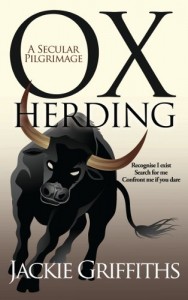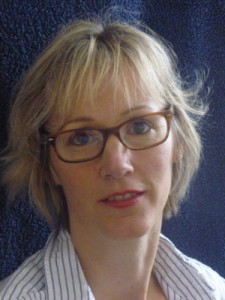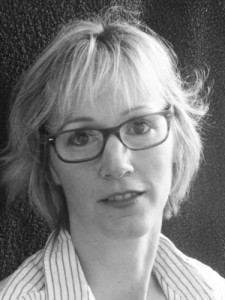Author Interview: Jackie Griffiths
On her novel, Ox Herding: A Secular Pilgrimage
Today, I’m delighted to welcome Jackie Griffiths to my blog. Jackie has a BSc in Psychology and Computing and an MA in Psychoanalytic Studies, and has been writing fiction and non-fiction material for twenty years. In 2003 she founded an online copywriting business providing content for websites, print and digital media, before selling up to concentrate on her novels and short stories. She now lives in abject poverty in the freezing ruins of an old sewage works somewhere in the UK, where she is working on her third novel.
Please tell us how you came to be a writer.
Several years ago an older friend of mine was diagnosed with cancer, and told me that he would have to undergo chemotherapy for three months. Due to the fact that several hundred miles separated us physically, and I had my family depending on me, I could not travel to be with him in person. Instead I vowed to write him an email every day in order to keep him company, and to ‘be there’ for him as best I could. The emails gradually evolved into fairly long stories to keep him distracted and entertained, which he greatly looked forward to. He couldn’t leave the house for long periods of time due to being immunocompromised, and he was completely on his own without wife, family, or partner. At one point during this trying time he suggested that I had a real talent for writing, and should consider making a career in the field. I then remembered I had wanted to write a book twenty years ago, and had even formed the perfect idea… That very same evening I sat down and started writing a novel. Six months later it became my first published book: Ox Herding: A Secular Pilgrimage.
Have you always felt driven to write?
I started writing when I was very young, still at junior school. I wrote stories in my spare time, and dreamed of the day I would be a writer when I grew up. My best subject at school was English – a class in which I was once told that I had too much imagination. (Is this possible?) I started a detailed, daily diary at the age of sixteen and continued this for a decade. It’s fascinating to read back on now. A true insight into the workings of a young teen mind and the problems, worries, hopes and desires that occupied me nearly thirty years ago. In the first year of senior school I wrote a prize-winning short story – I was eleven years old. It was about twin babies inside the womb, written from their perspective as if they could think and communicate. One dies and the other is left to live on alone until birth (which is when the story ends). I won a brand new pack of colouring pens for my efforts, and was extremely proud. I have no idea what on earth inspired me to write such a morbid story at such a young age, having never experienced death or tragedy, nor had a twin brother or sister. And yet… at the age of thirty-nine I went on to have twin babies myself.

Click here to buy from Amazon, Nook or Smashwords.
The protagonist in Ox Herding: A Secular Pilgrimage is Jae. What five words best describe her?
Open, curious, willing, adventurous, loving.
Where is the book set and how did you decide on its setting?
The book is about a real-life journey that anyone can take, in a philosophical sense. The events it describes and the transformations that take place are the ones that develop and emerge in our minds and souls. I have imagined that philosophical hinterland inside us – the place where we hold a candle out into the dark and ask, “what does it all mean?” – as an actual, physical landscape that Jae travels through in a Carrollesque adventure. The moment she enters this strange land is the moment she crosses the bridge from conscious life into the unknown tundra of the unconscious:
A muffled hush and stillness descends, like mist, and the further she progresses, the stronger her feelings of unreality become. The only sounds she can hear are her own shallow breathing and the occasional creak of the timber. It’s almost as if she’s standing on a boat that’s gliding soundlessly over the surface of the water without making a ripple. In addition, she has an uncomfortable feeling that this crossing is entirely a one-way journey; that there’s no possibility of turning round and going back the way she came. A critical process is being engaged and from this point on, it’s forward only.
The way she returns back into the conscious world from the land of spirituality is when she ends a train journey:
As Jae reaches the doors, the train enters the last stage of its deceleration before coming to a complete halt in the field by the river. She reaches out and turns the handle, opening the door into the night air.
“I’m leaving now. I am alone. I fully accept this. It’s the only possible way to continue; to stop travelling and actually arrive.”
Suddenly Douke leans out and thrusts the whip and halter into her hands. “These are the instruments of control you used to contain me. Perhaps keep them in the corner of your room as a memory.”
“I don’t need them any more,” she says, smiling fondly, tucking them under her arm. “But I’ll take them as a token.”
Taking a deep breath, she descends the steps and strides out across the grass in her comfortable trainers. The night air is refreshing but not cold even though she’s dressed in only shorts and a t-shirt.
“It’s mild out,” she says to no-one in particular, and continues on her way.”
What were the major areas you had to research?
In chapter two of Ox Herding, the main character, Jae, has to reject the major religions of the world – the ones that are genuinely chosen as alternative paths to the Western way of life. This meant I had to contrive that she repudiates religion, philosophies, systems, and the various methods people construct in order to protect them from emptiness, when they are at their best, their most wise, beguiling, and enchanting. Therefore it was essential to represent each religion seriously, without travesty. This took a lot of research and I was careful to avoid falling into stereotypes. But if you reject a religion when it’s presented to you in the extreme, or by someone who is disagreeable and rude, then you could be accused of not having explored the religion properly and therefore have no grounds to reject it. The main areas of research I had to undertake included:
1) Christianity
2) Islam
3) Buddhism
4) Psychotherapy
5) Existentialism
6) Atheism
7) Secular humanism
At what point in writing the book did you come up with its title?
Towards the end of the writing I started thinking about possible titles. Included in the short list were even some comedic ones such as, ‘Fifty Shades of Nothing’, ‘Nothing Much’ and ‘The Ten Steps to Nowhere.’ Others included ‘At Work in the Garden of Eden,’ and ‘Ten Degrees of Nothing,’

Do any of your books have dedications? If so, to whom and (if appropriate) why?
I have dedicated Ox Herding to my friend Brian Nicholson. Thirty years ago, when I was just a teenager, I had a crucial discussion with him about the meaning of life. He gave me a set of the ‘Ten Ox Herding Pictures’ and asked what I thought they were, and whereabouts I thought I might be on the path. I did my best to answer, but from that moment the pictures went into my psyche and stayed there simmering under the surface. “One day,” I thought, “I will write a book with ten chapters to describe the journey a young person makes in her search for meaning and purpose. One day I will know how to write it and what the content should be.” For twenty years the concept seeped from my mind through my soul into the marrow of my bones, and then suddenly last year I was ready. I sat down at my computer to write the chapter structure, which came out onto the screen almost without effort. Six months later the book was written and edited. Ox Herding: A Secular Pilgrimage describes a journey to find… that which has never been lost.
Some writers need silence, others like the buzz of a coffee shop, the rumble of a train or their favourite music. Which type are you?
Yes, I need silence to write – any noise is a distraction to me. I could never work in an office or coffee shop, I’d be too easily side-tracked by people-watching, and accidentally listening in to everyone’s conversations. Even the ticking of a clock can get annoying. Putting music on would also be completely distracting because when I listen to music I become completely absorbed in it, singing along and enjoying every note. I couldn’t be writing and creating at the same time as listening – impossible! I even prefer to shop at supermarkets that don’t pipe background music at me because I find that too irritating/distracting. I think I’m particularly sensitive to noise and sounds.
Do you have pieces of work that you think will never see light of day?
Definitely! When I was in my twenties I wrote a 70,000 word novel about a single mother – chick lit in the vein of Bridget Jones’ Diary (before that was published). I loved it at the time and got several positive letters from publishing houses, and one half-offer… but now I dislike it and won’t show it to anyone. I think it’s immature… but I suppose, one day, I could be persuaded to re-work it.
Is there a phrase or quote about writing that you particularly like?
Yes, someone once said to me, “a writer writes.” So simple and succinct, but also so true. If you are a writer then you write. You can’t say “I’m a writer,” and yet at the same time not be writing. It was meant as an encouragement, and it worked.
Can you remember being read to by your parents as a child?
Yes, my father read me Watership Down and my mother, The Hobbit. I was enthralled by both, and when I was a little older it was fantastic to be able to read them myself and experience the stories all over again. But there is something very special about being read to, lying in bed staring at the ceiling as someone else slowly and carefully reads you a story, and you become totally absorbed in another world.
What is your favourite opening line of a novel?
“My Imperial life began with a smell. A rotten smell that came from my father’s coffin…”
This is a book called Empress Orchid by Anchee Min, based on the true story of the last Empress of China. I own many books about real life in China at the turn of the 20th century, and they all fascinate me.
Are there any books that you have given up on half-way through? And, if so, why?
I’m afraid to say that there is one book I gave up reading. It is The Golden Notebook, by Doris Lessing. I was eager to read it and bought it recently in great anticipation, but only managed to get a fifth of the way through, before I put it down for good, realising that each time I picked it up to read I didn’t feel I was relaxing, enjoying myself, having a good time; it felt like work, like studying, and that’s not why I read fiction. I felt there were too many characters I didn’t care about, and it obsessed over a topic that was not relevant to me (communism during the 1940s), and I even found it slightly sexist! Perhaps if I’d given it more of a chance and persevered with the work I would have experienced something more positive, but I did try for some time, and in the end I just thought there are so many other wonderful, exciting, interesting books I could be reading and getting pleasure from – no need to continue battling on with something I’m not enjoying or getting much out of.
Are there any books that you find yourself returning to time and time again?
Yes, all the books on my bookshelf. I have one, large bookshelf at home, running from floor to ceiling, overflowing with books. However, each one of them have been read by me at least three times. When I love a book and buy it, I go back to it again and again, always delighted anew. Some examples:
Khaled Hosseini (A Thousand Splendid Suns)
Yasmina Khadra (Swallows of Kabul)
Tim Parks (Italian Neighbours)
Aravind Adiga (The White Tiger)
Indra Sinha (Animal’s People)
Jennie Erdal (Ghosting: A Double Life)
Siddhartha Mukherjee (The Emperor of all Maladies)
Da Chen (Colours of the Mountain)
Joan Brady (Prologue: An Unconventional Life)

What are you working on at the moment?
I am currently working on my third novel; working title: Breaking the Chrysalis. It starts with a prologue about an ordinary, married woman who goes out to sunbathe in the privacy of her back garden, but is spied upon by the old man next door hiding behind a newly planted oak tree. As he gazes lustfully upon her body, Susanna has no idea she’s being violated and continues to innocently relax in the sun. This unfortunate episode in the garden sets the tone for the novel; the neighbour likes to remind her that he’s seen her naked each time they cross paths, with the air of someone boasting about his achievement. He gives the impression of being unaware that it could embarrass or even offend Susanna to repeatedly hear about it, even in front of her children.
Susanna’s life is stable and established. She’s married but it’s a loveless relationship, and at times emotionally damaging. There are difficult neighbours, would-be lovers, friends that don’t make her happy, and all around it appears that people are enjoying illicit and legitimate passions, tenderness, and affection. At one point, she herself becomes peeping tom at a dinner party, when she catches a couple embracing and becomes mesmerised, watching and longing for it to be happening to her. She yearns to feel something, to be infused with the fire of desire, to be excited and full of life once again. But this unattainable paradise seems denied to her. She talks earnestly to her friends about feminist issues, about sex within marriage, outside the marriage, moral dilemmas… She searches for something to connect with, to give her life meaning. She has a brief affair with a married neighbour, who makes an outrageous proposal, but her heart’s not in it and she ends the relationship feeling no better off.
Does she eventually break out of her chrysalis? Does the pupa finally metamorphose into a butterfly? If so, how does she do it? What inspires her or causes her to suddenly make a bid for freedom after years of accepting the situation? And what impact does this have on her marriage, children, and friendships?
If you would like to find out more about Jackie, you can connect with her on Facebook.


